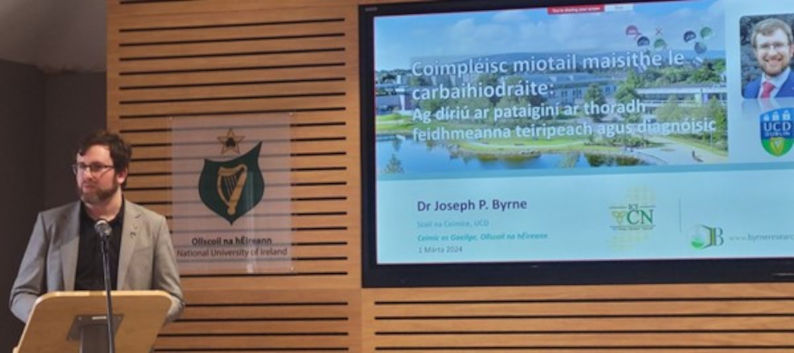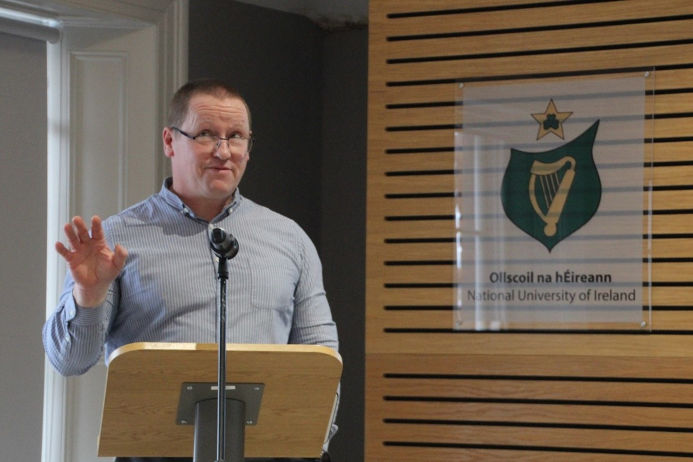2.10.2024
National University of Ireland is a network of research-intensive universities. The work at our member institutions has made, and continues to make, a lasting and positive impact on our wellbeing and the world around us. Recently, we have had lots of great updates about the work and research being done at NUI institutions and have been fortunate enough to see them celebrated on a national and international level.
European Research Council Starting Grants
The ERC Starting Grant is a prestigious funding initiative aimed at supporting groundbreaking, high-risk, high-reward research across any field. The grant enables early-career researchers to cultivate their potential and drive scientific progress, supporting innovative projects that expand the frontiers of knowledge and pave the way for new research avenues in Europe. Of the seven Irish recipients, five of them came from NUI member institutions.
From University College Cork, Dr Sanathana Konugolu Venkata Sekar has been granted €1.58 million for his project entitled “NOBIAS: Novel diffuse optical method to combat skin colour bias in non-invasive optical biomarker sensing devices”. This work will explore how skin colour bias in healthcare devices can be eliminated, allowing people of colour to access the same quality of healthcare through more accurate diagnostics.
Dr David MacManus of University College Dublin will receive €1.5 million for his project “brainsex: Bridging the sex gap in traumatic brain injury biomechanics”. Like Dr Sekar’s NOBIAS project, Dr MacManus’ project also takes a look at how healthcare can be improved through challenging the normativity of existing healthcare models. His work will develop sex-specific computer models of the brain incorporating specific neuroanatomy, so that the biomechanics of traumatic brain injuries take into account these specificities.
Dr Junli Xu, also from UCD, receives €1.5 million for “PlasTox: Machine Learning Combined with Spectral Imaging for Inferring the Toxicity of Micro- and Nanoplastics”, where she will research how micro- and nano plastics (MNPS) can impact human digestive health and develop models that predict this impact and assist in risk assessment. The research will be groundbreaking in the fields of both microplastics and toxicology.
Dr Catalina Vallejo Giraldo from University of Galway was granted €1.5 million for her project “TrapKill: Trapping and Killing Glioblastoma”. With this grant, Dr Vallejo Giraldo will work on developing a new cancer therapy that will trap and kill cancer cells, allowing a localized brain cancer therapy. It builds on her research on neural biomaterials which provide a foundation for this therapeutic innovation.
Finally, Prof Imran Sulaiman of Royal College of Surgeons received €1.87 million for his project entitled “eMOCA: Early Multi-Omic Cancer Assessment”. This research aims to improve the early detection and treatment of lung cancer. Prof Sulaiman’s research will take a multi-omic approach to finding new indicators of lung cancer in human biology, which will help to diagnose and target lung cancer more quickly and with greater accuracy.
NUI applauds these researchers and their departments for the innovative work that they are undertaking, and the ERC for supporting these projects.
European Association of Archaeologists’ Book Prizes
We were delighted to see that Professor Gabriel Cooney’s (2003) Death in Irish prehistory was awarded the EAA Book Prize 2024 at the European Association of Archaeologists’ conference in Rome on 28 August.
The book, supported by an NUI Grant towards Scholarly Publication, explores life and death in Ireland over an 8,500-yearperiod (8000 BC - 500 AD) and features illustrations by Conor McHale. An exceptionally beautiful book, it waspublishedby the Royal Irish Academy (RIA) in 2023.![Gabriel Cooney outside Hodges Figgis, Dawson St, Dublin 2, with his award-winning book Death in Irish Prehistory.
[image courtesy of the Royal Irish Academy]](../../images/news/2024/celebratingProjects_NUI_Institutions/GabrielCooney.jpg)
The EEA selection committee noted that the book ‘iswritten in an engaging manner, with sensitive reflections on how the living deal with death today as well as in the past.’
Gabriel Cooney is Emeritus Professor at UCD School of Archaeology, which can be very proud of not one, but two colleagues. Professor Graeme Warren was also awarded the EAA Book Prize this year - a notable achievement given the shortlist of six books representing research excellence across the European higher education sector.
NUI offers Grants toward Scholarly Publications to current staff (including full-time and part-time staff and post-doctoral fellows), retired staff, and early career academics from the NUI member institutions. Grants of up to €3,000 may be awarded to support and encourage the publication of scholarly research.
‘Publications’ is interpreted broadly and may include monographs, edited collections, journal articles, and audio-visual productions.
The NUI Publications Committee considers applications twice a year, in June and December.
with his award-winning book Death in Irish Prehistory.
[image courtesy of the Royal Irish Academy]
Ceimic as Gaeilge
Fuair Ceimic As Gaeilge aitheantas i roinnt bhfoilseachán le déanaí. Ar an 1 Márta, chun céiliúradh a dhéanamh ar Seachtain na Gaeilge, d’eagraigh Líonra na gCeimiceoirí Óga ICÉ imeacht darbh ainm Ceimic As Gaeilge 2024 do lucht acadúil na ceimice chun a gcuid taighde a phlé as Gaeilge.
Bhí an t-imeacht seo ar siúl in OÉ, 49 Cearnóg Mhuirfean. D’eagraigh Leas-Chathaoirleach LCÓ Cathal Ó Ceallaigh, ó Ollscoil na Ríona Béal Feirste, agus an Comhairleoir an Dr Iósaf Ó Beirne, ó Coláiste na hOllscoile, Baile Átha Cliath, an seisiún seo. Bhíomar an-sásta in OÉ tacú leo trí ionad a chur ar fáil dóibh.
Luadh an t-imeacht seo sa dara eagrán de chuid Irish Chemical News 2024 mar an chéad imeacht dá leithéid riamh. Luadh é in UCD Today Spring Summer 2024 freisin.
Táimid go léir ag tnúth go mór leis an gcéad imeacht eile de chuid Ceimic As Gaeilge.

An Dr Iósaf Ó Beirne, Coláiste na hOllscoile, Baila Átha Cliath

An Dr Patrick O’Leary, Cláiraitheoir, Ollscoil na hÉireann
Further information from:
Dr Patrick O'Leary
Registrar
National University of Ireland
49 Merrion Square
Dublin 2, D02 V583
Ph: 01 4392424
www.nui.ie
Twitter: @NUIMerrionSq
Facebook: National University of Ireland
« Previous






















